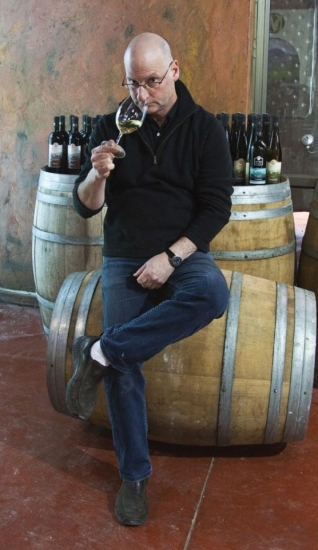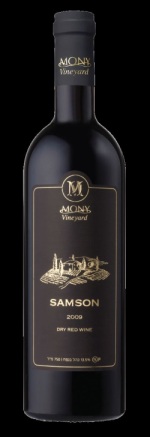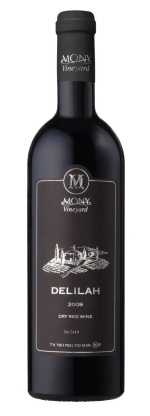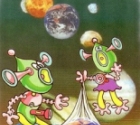
I rarely find an interesting wine or winery that doesn’t have a compelling story behind it and its winemaker. The Mony Winery is a case in point. Located at the top of the Soreq Valley overlooking its vines in the Judean Hills opposite Beit Shemesh and on the same street as the Teperberg and Tzora wineries, is the Mony Winery, owned by the Christian Arab Artul family. It is adjacent to a monastery. Founded in 2000, with 650 dunams of vines, they produce a significant quantity of grapes, not only for themselves but for other wineries too, including their neighbor, Teperberg. Since 2005, the winery has been kosher and therefore accessible to all Israeli consumers. They’ve established themselves as a value-brand, producing 100,000 to 120,000 bottles per year under 20 different labels. That’s an amount of labels comparable to some wineries ten times their size.
In 2009 the Artul family made a significant decision to increase the value of what their customers were getting for their money by hiring Canadian-born and Australian- trained winemaker, Sam Soroka, who had left the Carmel Winery after years of working on their premium wines. Since then Mony wines have made dramatic improvements, each vintage startling consumers and industry insiders alike with the good quality of the wine at each of their price points.
To prove that point, at a release dinner at the renowned Blue Rooster Restaurant in Tel Aviv, presenting Mony’s two newest wines, wine writers were greeted with a glass of 2011 Mony Colombard (90 points). This well-crafted, crisply acidic and fruity white wine is made from the typically unheralded workhorse grape and sells for about NIS 39 or 3 for NIS 100, yet it delivers the nuances and character of whites selling for almost twice the price. As a testament to Sam’s skill and curiosity, it’s the only yearly single varietal Colombard typically available in Israel. The Recanati Winery made a limited release in 2011 of 300 bottles, but most often Colombard is a blending grape in Israel or a component in sparkling wines. It is refreshing to see, or rather taste, what can be done with this grape when it is properly nurtured in the vineyard and attended to by a skilled winemaker. Similar results have been obtained by wineries which have given the red workhorse Carignan special care.
Yet the evening at the Blue Rooster wasn’t intended be an introduction to Mony’s Colombard which many of us had sampled at festivals that Mony has attended. The stars of the evening were two new premium reds that were a coming-out party for the winery. Previously, their most expensive wines were their Reserve red wines, available for about NIS 79. That night the winery dramatically released two wines available for NIS 159.
According to Sam, the winery had considered many names before deciding on Samson and Delilah, yet the names seemed to be perfect fits, as if the wine was made to match the names instead of the names being chosen to describe the wines. The 2009 Mony Samson (90 points) is what Sam describes as a “winemaker’s wine”. By that he means that he chose his favorite grapes from what was available and attempted to make the best wine possible. With 45% Cabernet Sauvignon, 45% Shiraz and 10% Petite Sirah, this blend definitely shows Sam’s Australian education at the University of Adelaide. Cabernet and Shiraz blends are commonplace in Australia and not uncommon in Israel, especially with other Australian-trained winemakers. Yet this wine, with only 14% alcohol, resembles more of an Old World wine. It does have the structure of a New World wine, yet it comes across as being more elegant than its components might foretell. Cassis, blackberries, raspberries with hints of blueberries and notes of cigar-box appeared, and the wine was accessible after minimal decanting and was well integrated and balanced after aging 18 months in mostly medium-toasted French oak barrels with small amounts aged in American barrels.
Just as the biblical Samson was a strongman, Delilah was a seductress, yet instead of seducing the long-locked Samson, she aimed her sights that particular evening at charming a long table of wine writers, many of whom are obviously more follically challenged than Samson. The 2009 Mony Delilah (92 points) is a traditional Bordeaux blend of 50% Cabernet Sauvignon, 30% Petit Verdot and 20% Merlot. Often in such a blend the Merlot might play a larger role than the Petit Verdot, but Sam has grown attached to these Estate-grown grapes. When he first arrived in 2009 the family had been selling off all their Petit Verdot to other wineries, but Sam insisted on keeping all of the grapes for Mony wines, and this wine is one of the first dividends. Aged in only French oak, this wine is a more gentle wine than the Samson, yet the generous amount of Petit Verdot gives Delilah the structure and body to hang 1000 veils of black and red fruits, flavors and aromas. It is gentle enough to drink on its own, as is the Samson, but both come into their own when matched with fatty or grilled meats such as the flavorfully spiced tandoori chicken, entrecote steak and skewers of lamb which we were served. All of the countless delicious treats coming from the kitchen of celebrity chef Shaul Ben-Aderet framed the wines like master works of art being presented in a gallery.
Those present also got a sneak preview and taste of the yet to be released 2010 Mony Cabernet Sauvignon Reserve. The 2009 was Sam’s first vintage and he won a lot of praise for delivering an impressive wine at a reasonable NIS 79. The preview of the 2010 gave us insight into the role played by the Cabernet in the Samson and Delilah, but also into the fact that Sam’s successes aren’t limited to one particular vintage, and that as long as his tenure continues we can expect expressive wines at reasonable prices for years to come.
With many of their 20 labels sold out at the winery and disappearing off wine-shop shelves almost as quickly as they arrive, it might be encouraging to know that their NIS 59 2012 Mony Gewurztraminer will be hitting the shelves before Purim 2013, with their wide array of other wines soon to follow.


 Milestones 168
Milestones 168 “Be our Guest” at Beauty and the Beast
“Be our Guest” at Beauty and the Beast Advertisers List
Advertisers List-1516356428.jpg) Hand in Hand Food Pantry
Hand in Hand Food Pantry Forever Slim
Forever Slim Food Foolish
Food Foolish David Rhodes
David Rhodes